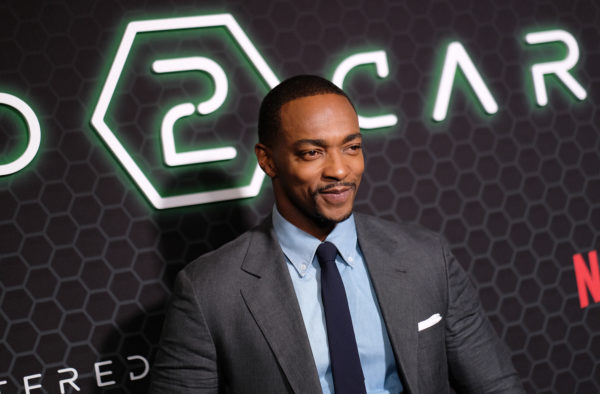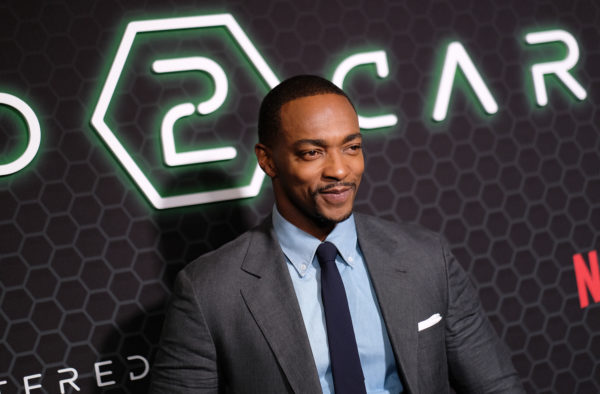‘I Didn’t Want to be the Face of the First Marvel Franchise to Fail’: Anthony Mackie Says It’s a ‘Huge Fear of His,’ Feels Weight of Responsibility as Black Supehero
Anthony Mackie has no qualms about what he needs to prove.
“There were certain pegs. My first was ‘8 Mile.’ It was a monumental step at the beginning of my career,” Mackie told Variety in a recent interview. The Eminem-led film would go on to gross over $240 million, while the rapper himself has an estimated net worth of $190 million.

“After that it was ‘Half Nelson.’ It blew up Ryan Gosling, so I was there to ride the wave. Then ‘The Hurt Locker,’ and it blew up Jeremy Renner.”
Ryan Gosling was only paid around $3,200 for “Half Nelson,” which led to an Academy Award nomination, and more critically acclaimed roles in “The Big Short” and “La La Land.” As of 2021 his net worth is estimated to be $70 Million.
“It was the joke for a long time — if you’re a white dude and you want to get nominated for an Oscar, play opposite me. I bring the business for white dudes,” said Mackie.
He may have had a de facto role as the good luck charm, but the actor realized that his abilities extended far beyond that.
Now at the helm of his own self-titled Disney show, Mackie is finally where he worked so hard to be.
“I was really surprised and affected by the idea of possibly getting the shield and becoming Captain America. I’ve been in this business a long time, and I did it the way they said you’re supposed to do it. I didn’t go to L.A. and say, ‘Make me famous.’ I went to theater school, did off-Broadway, did indie movies and worked my way through the ranks. It took a long time for this s–t to manifest itself the way it has, and I’m extremely happy about that,” Mackie said.
He recalled the success of “The Hurt Locker,” which the actor thought would propel him to the heights of Hollywood stardom. However, despite the accolades, there were more strides to be taken.
“I thought I would be able to move forward in my career and not have to jostle and position myself for work. To get into rooms with certain people. I thought my work would speak for itself. I didn’t feel a huge shift,” he says, “but I one hundred percent think that ‘The Hurt Locker’ is the reason I got [‘Captain America: The Winter Soldier’].”
It was his introduction to the Marvel franchise, and Mackie’s character of The Falcon lasted all the way until Captain America passed his mantle over to him in “Avengers: Endgame.” The performer said he realized the significance of the role and weight of what he carried on his shoulders.
“I didn’t think we could do on the television what we’d been doing on the big screen. I didn’t want to be the face of the first Marvel franchise to fail. Like, ‘See? We cast the Black dude, and now this s–t is awful.’ That was a huge fear of mine, and also a huge responsibility with playing a Marvel character,” Mackie said.
He expressed an innate sense of understanding about the ultimate expectations on him as a Black male actor, and with the untimely death of Chadwick Boseman, the greater responsibility that now lay ahead.
“For Chad and I, [representation] was never a conversation that needed to be had because of our backgrounds. There was a hinted-at understanding between the two of us, because we’re both from humble beginnings in the South; we have very similar backgrounds. We knew what the game was. We knew going into it,” he said.
Mackie credits his mother, who died unexpectedly when he was 15, for being his point of motivation in life.
He dealt with his grief by acting out at school, until a group of a teachers took him in as mentee, redirecting his attentions and driving him to auditions.
“It was unexpected and very untimely. I was 15 when she was diagnosed with cancer, and a few months later, she was gone. She passed the day before my ninth-grade graduation,” he said. “If my mom wouldn’t have passed away when I was so young, I wouldn’t be where I am today.”
“Everything I did, I did for my mama. The idea of leaving home at 17 to go away to school would have never been an option if she was still around. She was my best friend. Losing her gave me a kind of strength, and a desire to succeed.”
From there, in 1997 he was eventually accepted in the well-renowned Julliard School, as part of one of the school’s most diverse student bodies of that time.
Following his graduation, Mackie has since cultivated a diverse body of work, portraying notable figures like Tupac Shakur and Martin Luther King Jr.
Mackie counts legendary actor Samuel L. Jackson as a mentor and fellow co-star in several films. Jackson had many complimentary remarks for Mackie, saying he has “an innate quality that first and foremost makes everyone want to cast him.” Recalling a viewing of his 2010 Broadway performance in the play “A Behanding in Spokane,” Jackson admired the breadth of Mackie’s range as an actor.
“Watching him onstage, I thought, he’s a very adroit actor capable of putting on many hats. He’s fearless and will try to be anybody. Then, on my TV, he’s playing a nanobyte soldier or some s–t,” Jackson said.
Another mentor, Morgan Freeman, had some wise words for Mackie early on in a difficult phase of his career, and gave him valuable advice that has stuck with him since.
“We did ‘Million Dollar Baby’ together, and when we were shooting this movie, I got offered a play. When you do off-Broadway, it’s $425 a week. In New York, that’s really $75 per week. I got a movie offer at the same time, and it was buckets of money. Three Home Depot buckets of money were going to be dropped off at my door,” Mackie explained.
“The script was awful; the whole thing was slimy. I went to Morgan’s trailer and asked him what he would do. He took a second and said, ‘Do the play. When Hollywood wants you, they’ll come get you. And when they come get you, they’ll pay for it.’ That blew my mind, and I left him that day with such a massive amount of confidence. He’s been a huge influence on me.”

